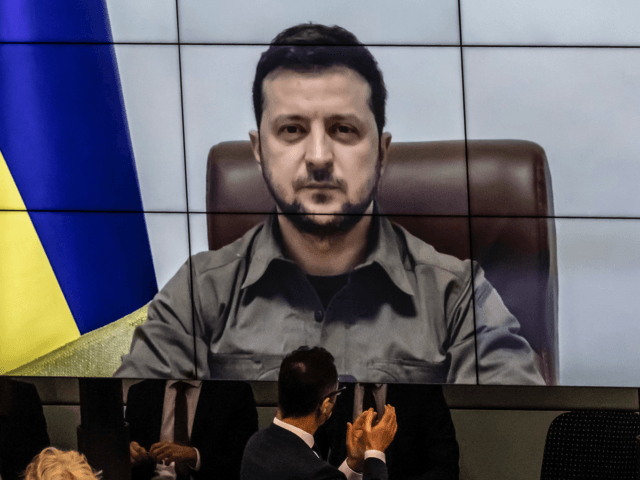In a video address to the German parliament, Ukraine’s President Volodymyr Zelensky invoked Cold War rhetoric, criticising the left-wing government of Chancellor Olaf Scholz for prioritising economics over peace.
Recalling the famous line from America’s President Ronald Regan — who is credited with overseeing the fall of the Soviet Union — Zelensky said before the Bundestag: “Mr Scholz, tear down this wall!”
The “wall” the embattled Ukrainian leader referenced was a conceptual one, rather than the Berlin Wall cited in the famous speech by Regan in 1987. President Zelensky attempted to correlate Germany’s apparent hesitance towards accepting Ukraine into the European Union and its reliance on Russian gas — and the controversial Nord Stream 2 pipeline — with the Cold War dividing line.
“We could see your willingness to continue to do business with Russia and now we’re in the middle of the Cold War. And again this is something you have failed to see,” Zelensky lectured the German parliament, according to public broadcaster Deutsche Welle.
“You’re still protecting yourself behind a wall that does not make it possible for you to see what we are going through,” he said, adding that “help came too late to stop war”.
Zelensky concluded by saying that Germany, which has reportedly been reticent to impose more sanctions on Russia, should enact more, insisting “peace is more important than income”.
After the invasion of Ukraine, Germany lifted its embargo on military weapons and equipment from being sent to conflict zones, which had previously blocked countries like Estonia from shipping German-made weapons to Ukraine. Germany has itself sent some 1,000 anti-tank weapons, 500 SAM surface-to-air missiles, and 2,700 missiles to Ukraine.
Germany’s Chancellor Olaf Scholz has also issued an order to halt the opening of the Nord Stream 2 pipeline, which like its predecessor was seen as a means for the Russian Federation cut Ukraine out of gas deliveries to Europe by going under the Baltic Sea.
Scholz has also finally committed to meeting the two per cent of GDP spending requirement for NATO in response to the war in Ukraine, falling in line with long-expressed desire from former President Donald Trump.
However, the German government alongside other leading NATO members have been reticent to take direct military action for fear of sparking a wider conflict over the former Soviet satellite state.
Following the speech from Zelensky, which was met with a standing ovation, controversy broke out in the Bundestag as the parliament swiftly shifted to other matters of state — namely the issue of compulsory vaccination. MPs from the “traffic light” coalition government of the Social Democratic Party (SPD), Greens, and Free Democratic Party (FDP) voting against holding a debate on the situation in Ukraine.
“Bombs fall on theatres where children seek protection and we are having a debate about compulsory vaccination — without decency, without respect, without dignity, instead of giving an answer to the Ukrainian president,” said Christian Democratic Union (CDU) MP Sepp Müller in response to the move.
The leader of the CDU, Friedrich Merz, questioned “when, if not now” should a debate on Ukraine be held, going on to demand of SPD Chancellor Olaf Sholz: “We want to know how do you see the situation and what consequences does Germany draw from it?”
In what has been characterised as an apparent snub of Zelensky, Sholz refrained from sharing his thoughts with the Bundestag — as Prime Minister Boris Johnson did following the Ukrainian leader’s address to Britain’s House of Commons — but instead chose to reserve his comments on the matter for Twitter.
“I thank Zelensky for his urgent words in the Bundestag. We see that Russia continues its cruel war every day, with terrible losses. We feel obliged to do everything possible to ensure that diplomacy has a chance and that the war ends,” the Chancellor wrote.
It remains to be seen how the brewing scandal will impact the fledgling government, which has seen its approval rating decline since coming to power — albeit with a slight uptick following the Russian invasion of Ukraine.
Commenting on social media, CDU MP Norbert Röttgen wrote: “Today was the most undignified moment in the Bundestag that I have ever experienced!”
Follow Kurt Zindulka on Twitter here @KurtZindulka

COMMENTS
Please let us know if you're having issues with commenting.